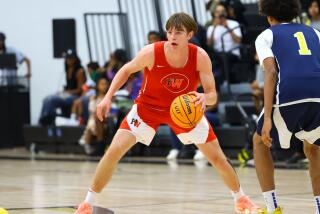Basketball Recruiters Find Talent in Canada
- Share via
CONCORD, N.H. — Winston Turpin bounces a basketball, grabs it high in the air, taps the backboard and then reverse dunks, and the capacity crowd of 3,000 goes wild.
Moments later, he takes off from just inside the foul line, soars over two stooping cheerleaders and turns on the crowd again with another slam dunk.
No, Turpin isn’t in the National Basketball Association, and this isn’t the NBA’s slam dunk contest. He is a high school player, not even a great one, and he plays in Canada.
He is one of the growing number of Canadian youths caught in the excitement and glamor of NCAA and NBA telecasts from the United States, and the lucrative college scholarships and pot of gold offered by the NBA.
These youngsters have spurned the national sport -- hockey.
With hockey played more on a club level, basketball has become a popular sport in the high schools and the general level of play, although still below schools in the United States, is improving, said Terry Thompson, the coach at Oakwood Collegiate Institute in Toronto.
One of Thompson’s kids, 6-3 guard Paris Dryden, will be at the University of New Hampshire this fall, while other Canadians have been recruited in recent years by schools such as UCLA, Michigan State, Syracuse, Duke, Villanova, Maine, Boston U., Providence, St. Joseph of Pennsylvania, Stetson, Fairleigh Dickinson and Hardin Simmons.
Michigan State, probably like most major basketball powers, only recruits in Canada when it hears of a particular player, Coach Jud Heathcote said. “We’ve got a coach or two who lets us know.”
But schools such as Niagara, St. Bonaventure and Canisius consider Toronto part of their recruiting area and usually have at least one Canadian on their rosters.
Now more scouts from similar second-tier Division I schools in the United States travel north of the border.
“When I first started here 20 years ago, I directed summer camps at Arcadia, Nova Scotia, for two or three summers,” said Skip Chappelle, who retired from coaching at the University of Maine this year. “There were very few, if any, Division I prospects. Now, we have two on our team. For schools like us, that (Canada) would be a prime area.”
In the last five or 10 years, there has been a “tremendous jump” in recruiting from U.S. colleges, said Jack Donohue, a long-time coach in the United States who has coached the Canadian national team since 1972.
They have try-out camps, all-star camps, primarily for U.S. recruiters, and the hottest place is Ontario, Donohue said.
During one Canada-United States high school all-star game this spring, many of the scouts came away talking about 6-foot-4 Phil Dixon of Bathhurst Heights in Toronto, Bill Linton of the Ontario Basketball Association said. Dixon may be Canada’s top prospect this year.
Marty Marbach, in his first year as coach at Canisius in Buffalo, said he left the game disappointed his scouts didn’t spend more time in Canada. Still, his school will play Niagara, which features 6-7 Brian Bleich of Governor Simcoe in St. Catharines, who UNH Coach Gerry Friel called “the best player I’ve seen all year.”
Marbach said U.S. college recruiters now travel to Canada to “see who’s there, rather than to see just one kid.”
“The goal of a lot of college coaches is to find a diamond in the rough,” he said. “Everybody knows everybody in the states.”
Friel calls Canada “virgin country” for basketball players.
Leo Rautins, who went to Minnesota and then transferred to Syracuse, probably was the best-known player to come out of Canada. He was picked in the first round of the NBA draft by Philadelphia in 1983, but injuries cut short his career.
Rautins had a big impact on Canadian kids; he showed it could be done, Donohue said. Mike Smrek of Canisius, a 7-footer with the NBA San Antonio Spurs, is another.
“There’s more emphasis because kids and parents see the opportunities that are there (in the U.S.),” Heathcote said. Canadian colleges offer no athletic scholarships.
But Canadian kids still don’t grow up playing basketball, he said. “If they’re not good enough for hockey, they drift into basketball.”
The exception, however, are those black youngsters whose families immigrated from places such as Jamaica, Trinidad and Guyana in the past 10 years. Coming from the tropics, hockey is not their game.
“Whatever the reason, basketball is their game,” Thompson said.
More to Read
Go beyond the scoreboard
Get the latest on L.A.'s teams in the daily Sports Report newsletter.
You may occasionally receive promotional content from the Los Angeles Times.










